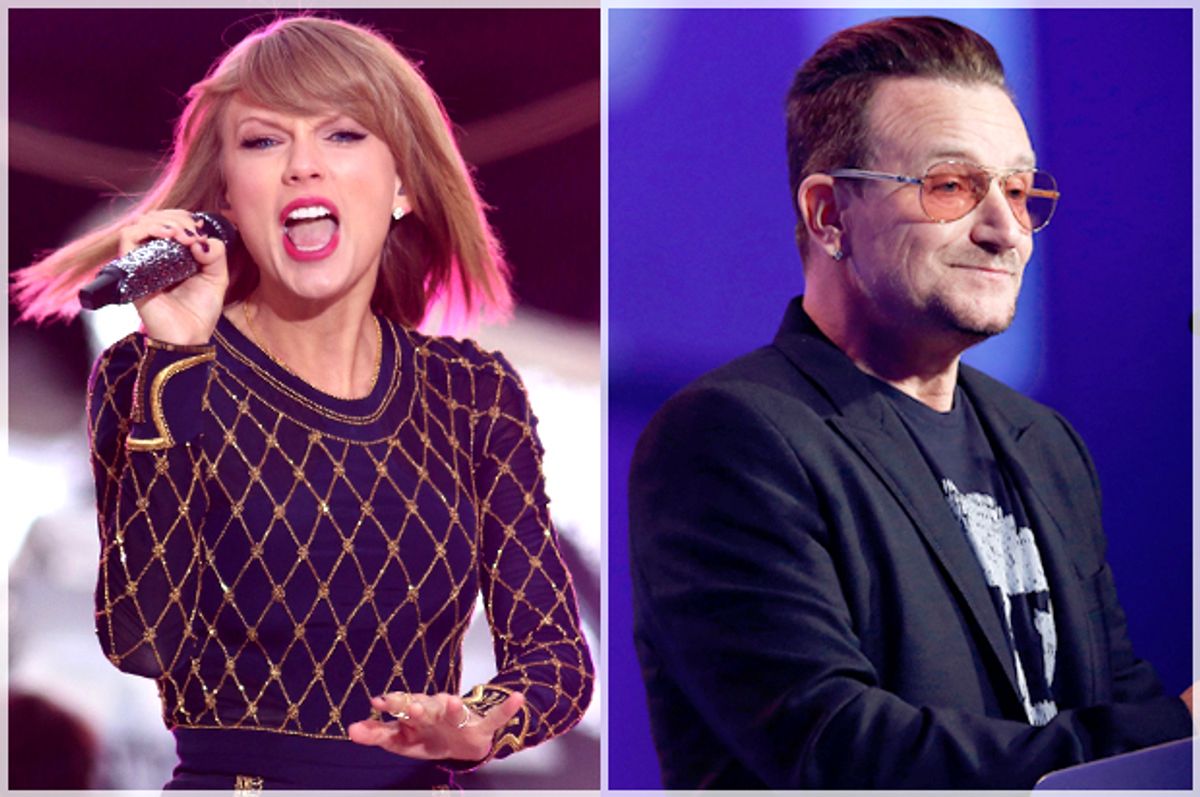Musicians have been speaking up about streaming platforms and their business models for years. But when Taylor Swift pulled her entire catalog off the streaming service as she launched her new album “1989” to overwhelming success, she accomplished what all the white, male, middle-aged alt rockers in the world couldn’t: She made people actually care about the ethics of Spotify.
Up until now, the loudest opponents of online streaming services have been elder statesmen like David Byrne, Thom Yorke and David Lowery. And their arguments have been easy enough for the average consumer to ignore — so math-y, focused on how much platforms like Spotify pay to rights owners, what record labels pay to artists, what’s the future of the music industry and where has it all gone wrong, Charlie Brown-teacher-voice wahmp-WAHMP-wahmp-wahm. It’s relevant to fellow musicians and music biz wonks, but terribly inside-baseball for the average music fan. The sobering-to-them fact is that most music listeners really don’t care about record label deals, royalty splits, percentages or any of that. Most people just assume any musician who doesn’t have to hold down a day job is doing fine financially. The details are just (super-boring) fine print.
Last week, Bono offered words of encouragement for Spotify’s “grand experiment,” urging musicians, especially younger ones, to use the streaming service to build an audience, deflecting blame for modest payouts onto record labels for not being transparent about where the money goes. As a “spoiled rock star,” he says he’s not the right artist to take up arms against Spotify. What does that mean, exactly? Bono already got his, so he’s not sweating it, and you kids are on your own? It’s a lukewarm endorsement at best.
Swift, who understands so well that packaging and delivery are everything, framed her decision in the simplified “all artists deserve to be paid fairly for their work” argument that she seeded in the Wall Street Journal over the summer. Swift then told Yahoo last week that she’s “not willing to contribute my life's work to an experiment that I don't feel fairly compensates the writers, producers, artists, and creators of this music. And I just don't agree with perpetuating the perception that music has no value and should be free.”
Precisely because Swift is a "spoiled" pop star, she has the financial weight to throw around in this argument. Numbers abound about what “fairly compensates” means for Spotify and Swift this year, with her label Big Machine countering a lowball $400,000 to Spotify’s estimated $2 million. And none of that actually matters in this argument. Swift understands her audience and knows the difference to them between $400k and $2 million is academic, just like the difference between David Lowery’s and David Byrne’s annual incomes pre- and post-Spotify. She knows it’s smarter to appeal to their sense of fairness, so she boiled it all down to one chewy ethical question: Do you believe that streaming services reinforce the idea that paying for music should be voluntary or not?
Spotify’s “freemium” business model is built on the assumption that people who can get the service for free will later pay for an upgraded version if they value it enough. As he told the Guardian last year, CEO Daniel Ek’s theory is that Spotify customers aren’t paying for music, exactly. They’re paying for convenience. The model only works, though, if the Spotify experience is truly a valuable one-stop source offering all of the music most people want. Right now — and for the foreseeable future — what millions of people want is Taylor Swift.
When Ek couldn’t turn the tide of public opinion against Swift in the immediate wake of her decision, he launched a new appeal: “Here’s the thing I really want artists to understand: Our interests are totally aligned with yours. Even if you don’t believe that’s our goal, look at our business. Our whole business is to maximize the value of your music. We don’t use music to drive sales of hardware or software. We use music to get people to pay for music. The more we grow, the more we’ll pay you.”
At this point, he’s not talking to Swift. Ek is aiming his message wider, at other hot young artists and their record labels who are undoubtedly watching the situation to see if they should follow suit. Taylor Swift doesn’t need Spotify to get her people to pay for her music. Spotify can thrive without the niche market of David Byrne's back catalog, but if it’s going to maintain its ubiquity, it needs Taylor Swift. And now that Swift might also be winning the public argument, other pop stars might be so bold if they feel their fans won't hold it against them, either.

Shares